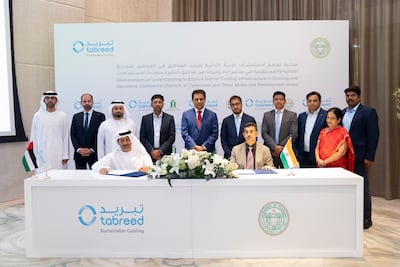The National Central Cooling Company, better known as Tabreed, has signed a preliminary agreement to explore development and investment opportunities in district cooling infrastructure in the southern Indian city of Hyderabad.
The cooling infrastructure will have the potential to reduce more than 200 megawatts of peak electricity demand, resulting in an annual carbon dioxide emissions reduction of 600,000 tonnes, Tabreed said on Friday.
Hyderabad is the capital of the Indian state of Telangana, which aims to become net zero by 2047.

“With India forecast to be the world’s largest consumer of cooling by 2050, Tabreed is proud to work with the government of Telangana and partners across the country to deliver reliable, affordable and sustainable district cooling solutions,” the company said.
Last month, Tabreed was confirmed as the preferred bidder for a long-term district cooling concession at the Hyderabad Pharma City master plan.
Hyderabad Pharma City is being developed as one of the world’s largest integrated clusters for the pharmaceutical industry.
Phase one will feature the construction of 2,500 refrigeration tonnes (RT) of district cooling capacity at an estimated cost of Dh36.2 million ($9.9 million), Tabreed said at the time.
The project will be expanded in phases as cooling demand rises, and is expected to reach a total concession load of 125,000 RT.
Tabreed is optimistic about growth in India and is looking at acquisitions and greenfield projects to expand in Asia’s third-largest economy.
In 2021, the company formed a holding company with the World Bank’s International Finance Corporation to invest up to $400 million over the next five years for the purpose of its expansion in India.
Cooling demand across India is projected to rise at a rate of 15 per cent to 20 per cent annually while aggregated cooling demand will expand by about eight times from 2037 to 2038, as compared to the 2017-2018 baseline, the World Bank said in a report last year, citing the India Cooling Action Plan.
Founded in 1998, Tabreed owns and operates 86 district cooling plants across the GCC, including 75 in the UAE, three in Saudi Arabia, seven in Oman and one in Bahrain.

